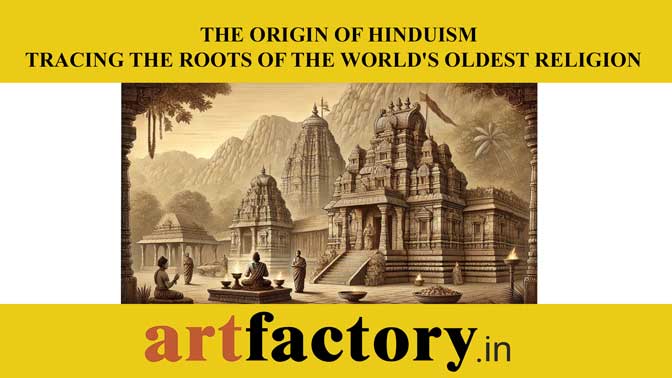
The Origin of Hinduism: Tracing the Roots of the World's Oldest Religion
Hinduism stands as one of the oldest and most complex religions in the world, with a history that spans thousands of years. Often referred to as Sanatana Dharma, or "the eternal way," Hinduism’s origins are deeply interwoven with the cultural, spiritual, and philosophical development of ancient India. In this blog, we’ll dive deep into the origin of Hinduism, exploring its roots, early practices, and evolution over time.
Understanding the Origin of Hinduism
The origin of Hinduism is not traced back to a single founder or specific historical event, unlike many other major religions. Instead, it is the result of a long, organic process of cultural, spiritual, and philosophical growth in the Indian subcontinent. Scholars generally agree that the beginnings of Hinduism can be linked to the Indus Valley Civilization (around 2500 BCE) and later shaped by the arrival of the Indo-Aryans.
The Indus Valley Civilization and Pre-Vedic Traditions
The early roots of Hinduism can be found in the religious practices of the Indus Valley Civilization, one of the world's earliest urban cultures. Archaeological discoveries, such as figurines of deities, sacred symbols like the swastika, and evidence of ritual bathing, hint at proto-Hindu beliefs centered around nature worship, fertility rites, and reverence for cosmic order.
While concrete details about their religious practices remain limited, these elements form the foundation upon which Hinduism was later built.
The Vedic Period: The Dawn of Hindu Philosophy
A significant milestone in the origin of Hinduism is marked by the Vedic Period (1500–500 BCE), following the migration of the Indo-Aryans into the Indian subcontinent. This era is crucial because it introduced the Vedas, the oldest sacred texts of Hinduism, written in Sanskrit.
The Vedas consist of four main texts:
- Rigveda
- Samaveda
- Yajurveda
- Atharvaveda
These scriptures laid the groundwork for rituals, hymns, and philosophical inquiry that shaped early Hindu society. The concept of Dharma (duty and righteousness), Yajna (ritual sacrifice), and the Pantheon of Vedic gods such as Agni, Indra, and Varuna played an essential role during this time.
Philosophical Evolution: From Rituals to Spirituality
As centuries passed, the rigid ritualistic practices of the Vedic age evolved into deeper philosophical and spiritual contemplation. This transformation is evident in the composition of the Upanishads (800–200 BCE), which shifted focus from external rituals to inner self-realization and the nature of existence.
Core concepts like Brahman (universal soul), Atman (individual soul), Karma (action and consequence), Samsara (cycle of birth and rebirth), and Moksha (liberation) began to crystallize during this period, setting Hinduism apart as a religion deeply invested in metaphysical inquiry.
Influence of Regional Cultures and Epics
Another vital aspect in understanding the origin of Hinduism is recognizing its adaptability. As it spread throughout India, Hinduism absorbed various local customs, traditions, and deities. This regional integration is beautifully illustrated in epic texts like the Mahabharata and Ramayana, which blend mythology, moral dilemmas, and devotion.
The emergence of Bhakti (devotion) movements further democratized Hinduism, making spirituality accessible to all, regardless of caste or social standing.
The Continuous Evolution of Hinduism
Unlike many religions with fixed doctrines, Hinduism’s origin is rooted in diversity and flexibility. It seamlessly integrates various schools of philosophy, including Yoga, Vedanta, and Samkhya, while embracing a multitude of gods, goddesses, and practices.
Its openness to new ideas allowed Hinduism to evolve over millennia without losing its core essence—making it not only the world’s oldest surviving religion but also one of the most adaptable and relevant.
Why Understanding the Origin of Hinduism Matters Today
In today’s globalized world, where spiritual seekers often explore various traditions, understanding the origin of Hinduism offers profound insights into human history, philosophy, and the universal search for meaning. Whether you are curious about the roots of Indian culture, the evolution of religious thought, or the profound teachings of ancient texts, delving into the beginnings of Hinduism provides a rich tapestry of knowledge and wisdom.
Final Thoughts
The origin of Hinduism is a story of continuous growth, adaptation, and deep spiritual exploration. From the Indus Valley Civilization to the Vedic age, and through the philosophical depths of the Upanishads and epic literature, Hinduism has remained a living, breathing tradition that continues to inspire millions worldwide.
FAQs About the Origin of Hinduism
Q: Who is the founder of Hinduism?
A: Hinduism has no single founder. It is a synthesis of various cultural, spiritual, and philosophical traditions that evolved over thousands of years.
Q: What are the main scriptures associated with the origin of Hinduism?
A: The Vedas, particularly the Rigveda, are considered the earliest sacred texts marking the beginning of Hindu religious thought.
Q: How old is Hinduism?
A: Hinduism is estimated to be over 4,000 years old, making it the world’s oldest continuous religion.

Comments : (0)